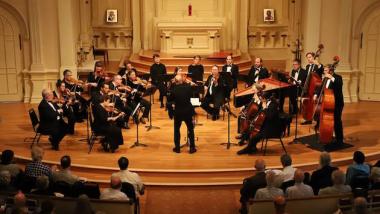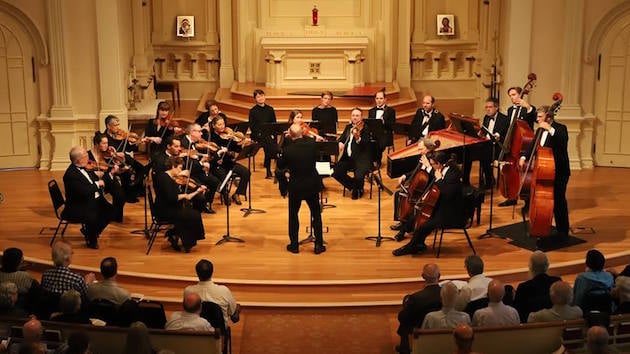
It was Wanda Landowska, the Polish-French harpsichordist, who said, “you play Bach your way, I’ll play Bach his way.” In 1933, she became the first person to record the Goldberg Variations on the harpsichord, helping to catalyze what might be called the first revival of early music in 20th-century America.
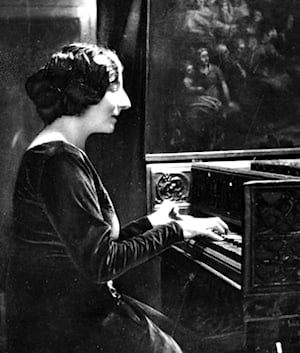
A second revival, toward the end of the century, is still under way and gathering momentum. Audiences, conservatories, instrument makers, festival planners, radio DJs, and record companies are all showing increasing interest. In many ways, the genre has generated it own populism, even among new music musicians and sound artists attracted by the “cool” and collaborative nature of Baroque culture.
Indeed, the interest has become so great that major orchestras play less Bach or Handel on their programs, because so much of that music has been co-opted by big name ensembles and record companies. Moreover, a growing number of contemporary composers write for period instruments. You think of Jake Heggie’s To Hell and Back (2006), commissioned by the Bay Area’s Philharmonia Baroque Orchestra, which, in October, will present a newly commissioned work, The Judas Passion, by Scottish composer Sally Beamish and librettist David Harsent
Early music programs are also catching on in academe. Yale has the largest. Indiana University and the University of Texas at Denton offer popular programs in the Midwest. Oberlin has a long-established program and USC has joined the game.
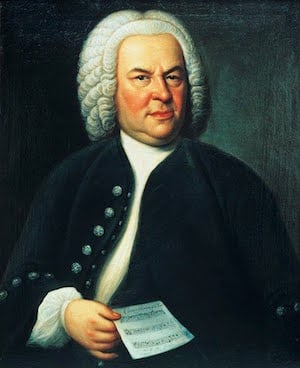
Naturally, this revival carries baggage, which includes debates over definitions of early music and, for example, whether the goal should best be described in terms of “authenticity” or else “historically informed” (or sometimes, historically inspired) performance. And which is more appropriate, which is truer to the spirit of the music: An ensemble that performs with a conductor or without?
Finally, there’s the matter of interpretation. Most of Bach’s work comes without detailed notation, as opposed to say, Mahler with his elaborate system of marks and instructions. And so, if the music is largely unguided — and of course there are no 17th-century sound recordings — what latitude does that leave the musician and the conductor? What’s the value of virtuosity? Or think of it this way: Which is more powerful here, the music or the musician?
As one person in the early music community put it, “The underlying problem in addressing these issues is knowing what was in the mind of those composers and musicians of the time. Just look at sound recordings from the turn of the last century. They sound like they’re from Mars. Imagine if you went back 300 years!”
The Revolution Goes Mainstream
“I can’t tell you what a shock it was,” Jeffrey Thomas told us the other day, “when I found out that Juilliard was offering an early music program.” He shook his head. “When I went to Juilliard, no one played music written before Schubert.”
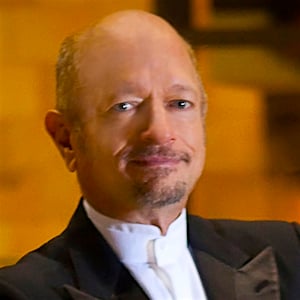
Jeffrey Thomas is artistic and music director of American Bach Soloists (ABS), which was founded in 1989 as a way to introduce modern audiences to the cantatas, instrumental pieces, and choral works of Johann Sebastian Bach, along with music written by his contemporaries. The ABS Baroque orchestra plays a series concerts each fall and is perhaps best known for its annual holiday performances of Handel’s Messiah at San Francisco’s Grace Cathedral. ABS just won a pair of awards from SFCV readers in the Best of the Bay poll.
Since 2010, American Bach Soloists has sponsored a two-week summer festival, which is held at the San Francisco Conservatory of Music, and offered in conjunction with an academy focused on Baroque music, staffed by some of the most renowned musicians in the country, and designed to serve outstanding students, and “emerging professionals” from all over the world.
“We’re past the tipping point,” said Thomas, 60, referring to the rising popularity of early music among both audiences and musicians. “There’s no question that, particularly in the last decade, there’s solid interest in playing this music — and playing it well. And why is this happening? Why this second revival? Because it’s no longer in the realm of secret societies or cults; because of the proliferation of early music ensembles and recordings.”
The allure has spread among music students of non-EM music who find that playing Baroque music often improves their understanding of classical music, as well as their technical expertise. “It makes you a better player of non-EM music,” Thomas insists. “It has so few instructions and so you have to adopt a different mental approach. As a performer, you need to see yourself as a medium through which the audience can appreciate a work of art. However, the goal is not to ‘interpret.’ This is the main difference between an ‘authentic’ performance and a historically informed performance. Authenticity implies a personal contribution, or reflection, and that’s okay if the audience is coming to see a particular performer, but if the audience is coming expressly for the music [as composed], then that demands a different point of view.”
Training the Historically Informed Ego
The American Bach Soloists Academy is nearly unique in this country — with the exception of the likes of the Oregon Bach Festival, which oversees the Berwick Academy. The ABS academy opened in 2010 with fewer than 50 students. This year, it accepted 69 students, along with 13 faculty members, 30 members of the ABS choir, and 16 regular members. They come from all over the country.
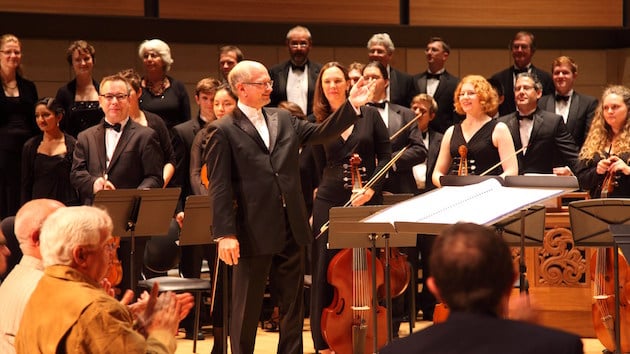
The ABS academy’s pedagogy grows out of Thomas’s conviction — and the conviction of a very distinguished faculty — that the best way to convey the true sense and sensibility of Baroque music is not with the musician’s ego. Perhaps one could say his approach is less postmodern than scientific; there’s no Identity Politics in Thomas’s view. And so, students set out on a painstaking process of examining the shape of a note, and how it peaks and when it peaks, and how a particular sound is based on flow and the harmony underneath, and then bringing four violins to be in musical synchromesh, polishing endlessly to get the most nuanced sense of perfection.
For Thomas, teaching the art of early music is akin to a psychological autopsy, in which the goal is to explore the inside of a fugue, or the nature of “sospiro” (a sigh), or how a “chromatic bit of angst informs the Kyrie Eleison.” For young singers, he’s forever trying to get them to understand the fundamental choice in deciding how to play something: do I add my own ornamentation or do I depend on a library of techniques that I know will heighten even more what the composer wanted this moment to feel like?
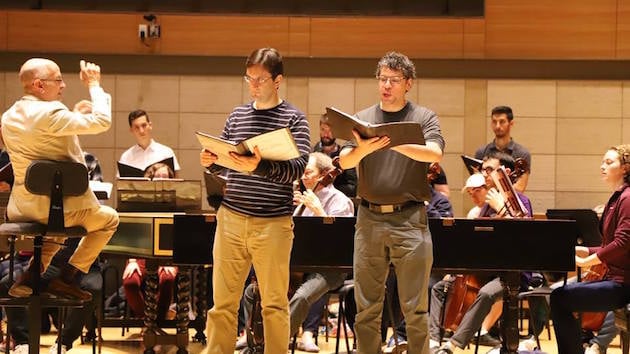
And all the while Thomas keeps posing the question of why Bach wrote something in a particular way, and “what’s in it for us?”
The result of all this surgery and polishing is a proper rendering; that’s the word Thomas prefers. “This way the composer is absolutely accessible because of the way we render the music. Even to say “portrayal” has a little falsehood in it. No, this is completely selfless — delivered without embellishment, without personal contribution.”
Talking With Your Bow
As an aside, beyond period instruments and the decoding of notes, there’s the question of conducting. In the 18th Century, the task fell to the concertmaster, the lutenist, or the harpsichordist. By today’s standards, they acted more as timekeepers than conductors. As one expert put it to us, “Anything can be said with your bow.”
Thomas’s response is that having a conductor certainly doesn’t violate the spirit of his concerts, or the promise of an informed performance. Moreover, given the exigencies of presenting large works, there’s really little choice. “A conductor offers a way to quickly coalesce a group of musicians and guide them through the many nuances involved in being historically accurate. “
Thomas prefers to describe his role as that of a guide but he also compares his responsibility to that of a film director who leads his many constituents to agree on an overall vision and then bring out the very best of their talents. “It’s important to remember that the conductor is the one who, arguably, comes to understand a piece of music better than anyone else in the group, and so it’s his or her responsibility to convey that understanding.”
Walking the Bass Lines
Daniel Turkos is a 32-year-old freelance bass player who lives in Philadelphia. He’s also a teaching artist for the El Sistema-inspired program, Play On, Philly! He first attended the ABS Academy in 2014–2015 and has been a regular member of the professional ensemble ever since.
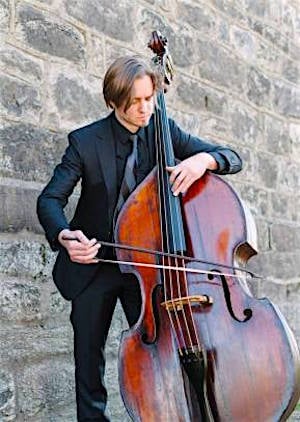
Turkos was introduced to early music while getting an M.A. at Penn State. He’d been focused on a career in jazz but one day, by accident, he fell into a gig with a Baroque ensemble. He taught himself the basics of a viola de gamba, and was immediately attracted to the warm, organic sound of gut strings. He also found himself drawn to the bass lines and chord structure of early music.
“Everybody thinks of jazz as a new form, but if you look at Bach’s chord progression, it’s a revelation. That really struck me while playing the B-Minor Mass. All I could think of was, ‘this is really deep.’ You think the progressions are going to go in one direction but then he throws in a sharp and, all of a sudden you’re in a different key.”
“I just fell in love with it,” he added. “I’m already doing something like this in jazz and now I can bring the same thing to a different art form.”
But there’s more to it. Turkos remembers the time during a rehearsal at the ABS academy when he made a “big down bow.”
“Jeffrey heard it, because of course he hears everything, and he was like, ‘I don’t know what you’re doing, but don’t do that — because if you listen to the text here the singers are not on a consonant, they’re not doing a ‘ka’ so you don’t want it to sound like a ‘ka;’ remember that it’s in the middle of the phrase so you don’t want to accent it.’”
“And I thought for a second, ‘wow, this is all interrelated and I’m not just playing bass here, I’m playing bass with the basses who are singing. It just made me feel like part of something much larger than myself. I’m not necessarily a religious person but when you perform something like the B-Minor Mass I feel like you’d be dead if you didn’t acknowledge the fact that this was inspired by God!”
Turkos believes that the academy has changed his musical identity, that he arrived as a bass player and left a much more complete musician, which has enabled him to develop his voice, for one, and also his interest in conducting. “I just keep thinking about the grandness of it all.”
As for the broad appeal of early music, Turkos thinks the secret, for musicians at least, is a sense of empowerment and ownership. Each performance is slightly different, just because there are no marks or instructions. No filters. So always the trick is to respond to the spontaneity. The odd truth is that the real authenticity of the music in a performance is determined by the authenticity of the musician playing in it.
“An audience can tell if you’re being authentic,” said Turkos. That’s the real nature of an authentic historically inspired performance
There is an apparent contradiction with early music in that the freedom to render it seems at once restricted and yet highly encouraged, indeed essential. You get the idea that the music, when played to perfection, is guided by — for lack of a better word, a less dramatic word — the soul of each musician, and conductor, if there is one.

